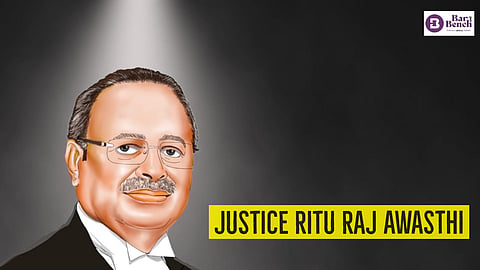
- News
- Columns
- Interviews
- Law Firms
- Apprentice Lawyer
- Legal Jobs
- हिंदी
- ಕನ್ನಡ

Spotlight is a series where we shine the, well, spotlight on lawyers, judges and legal experts who made news over the past week.
The Bench headed by Karnataka High Court Chief Justice Ritu Raj Awasthi presided over the much-publicised hijab case that conducted eleven sittings over the past couple of weeks before reserving its verdict.
There were also orders and remarks in other cases that came from his Bench this past week.
When he was sworn in as the new Chief Justice of the Karnataka High Court in October 2021, Justice Awasthi said that he would strive to make courts accessible to all, especially those from marginalised and underprivileged communities.
Since then, the Court has made significant strides in breaking the digital divide by consolidating the system of live streaming of proceedings, which was started on an experimental basis in May 2021.
Even as lawyers appearing in the hijab case expressed reservations on live-streaming the proceedings, the hearing saw an exponential rise in viewership. Subscribers to the Karnataka High Court’s official YouTube channel crossed the 1 lakh mark, and have more than doubled since February 10, when there were only 43,000 subscribers.
Born on July 3, 1960, Chief Justice Awasthi graduated in law from Lucknow University in 1986. Thereafter, he enrolled as an advocate on February 1, 1987.
Following his practice in civil, service and educational litigation at the Lucknow Bench of the Allahabad High Court, he was appointed an Assistant Solicitor General of India before his elevation as a Judge.
He was elevated as an Additional Judge of the Allahabad High Court on April 13, 2009, and took oath as a permanent judge on December 24, 2010. He was appointed as Chief Justice of the Karnataka High Court on October 11, 2021.
In August 2021, in a matter before the Allahabad High Court related to the cleaning of the river Ganga, the Bench headed by Justice Awasthi had said that the nation’s future depended on the well-being of the river.
“The future of this nation to large extent will be depending on health and well being of this river. It is, therefore, imperative that every effort should be made to revive the river and make it pollution free. Prime Minister, Narendra Modi after getting elected from Varanasi Parliamentary seat in May, 2014 said, 'It’s my destiny to serve Maa Ganga’,” the Court noted.
On Friday, the Bench headed by Chief Justice Awasthi reserved its verdict in the hijab case after a 11-day marathon hearing. Presiding over the matter, he urged counsel appearing for various parties to make their arguments brief, and asked them not to repeat submissions so as to save the time of the Court. He also refused to hear arguments by intervenors, and instead assured them that their written submissions would be perused by the Court.
"We cannot hear this matter for six months," he said even as various lawyers appearing for the intervenors sought time to make submissions.
The Bench heard extensive arguments on the scope and limitations of various fundamental rights, including the right to freedom of religion under Article 25 and the right to freedom of expression under Article 19(1)(a).
During the same week, another Bench that the Chief Justice was a part of heard a case involving the issue of legacy waste in Mangaluru. Legacy waste refers to waste and garbage that has accumulated over years, usually in a place such as a landfill.
While ordering the presence of the Mangaluru City Corporation Commissioner and to get sanction for the exercise at the earliest, the Chief Justice remarked,
“Ask him to go and sit there until the approval is granted by the cabinet... We know how the government works, that is the unfortunate part. I have realised in the last 5 months now.”
In another crucial verdict, a Bench headed by Justice Awasthi held that an Indian court can exercise jurisdiction to enforce an international commercial arbitral award rendered outside India, between parties who have no connection to India in certain circumstances.
The ruling, which was in light of the New York Convention of which India is a signatory, meant that a Court can enforce a foreign arbitral award since the property is expected to dock at the New Mangalore Port, which is within the territorial jurisdiction of the Court.
In a significant move, he called for the constitution of a Commercial Division at the High Court to hear challenges to international commercial arbitration awards. A circular to this effect was issued pursuant to a judicial order passed by the High Court on February 16. In that case, the Division Bench of Chief Justice Awasthi and Justice Suraj Govindaraj had also held that the High Court alone has jurisdiction in a challenge to an award passed in an international commercial arbitration.
While hearing a suo motu petition over dearth of public prosecutors in the State, the Bench headed by Chief Justice Awasthi noted about 300 courts were unable to function as they did not have have public prosecutors. As a result of this, undertrials were left languishing in prison, the Bench noted.
The State government was directed to fill all the vacant posts within a period of three months.